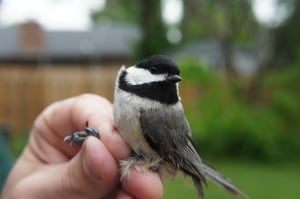For a brief time when we were first married, my wife worked at a daycare center. She mentioned one evening that some of the kids had “KB” annotated next to their names on some list they used to organize activities, with “KB” shorthand for “known biters.” Those known biters required just a bit more vigilance to keep in line . . .
In my world, known biters are birds. Last week, I spent a couple of days mist-netting and banding with my friend Greg, and we got to handle 9 different species. Some birds are a delight to handle when mist-netting and banding. Some will inflict painful bites. This little photo essay illustrates some known biters doing their best work!
Woodpeckers can, of course, stab rather painfully but their beaks are generally too long to pound the hand that holds them. Chickadees are a favorite of mine: they have a habit of repeatedly hammering on exactly the same square millimeter of your knuckle. The first strike doesn’t hurt that much, but by the 28th? Yeah, it kind of smarts.
-

Carolina Chickadee. Don’t let the adorable exterior fool you: On the inside, she’s absolutely convinced that she’s a Tyrannosaurus rex. -
Carolina Chickadee. Don’t let the adorable exterior fool you: On the inside, she’s absolutely convinced that she’s a
Tyrannosaurus rex
.
Vireos have that little hook at the tip of their bill and they like to grab hold of your flesh with it and twist. That’s a pretty good bite.
-

A Red-eyed Vireo showing me who is boss. -
A Red-eyed Vireo showing me who is boss.
However, the worst – among songbirds at least – must be the cardinals and grosbeaks (though I’m told shrikes are pretty bad!). I’ve not had the pleasure of being bitten by a Rose-breasted Grosbeak, or for that matter, the terrifying Yellow Grosbeak, but I’ve handled lots of cardinals. When a cardinal bites you, it latches on – usually along the side of its bill rather than the point at the tip – and simply keeps applying greater and greater pressure. It’s amazing to feel the strength of the bite force in that tiny head. The effect is very much like being caught in a vice, and it can be excruciating. Sometimes, I have to put myself in an almost zen-like state to endure the pain while I continue to work on the bird either to remove it from the net or continue taking measurements on it prior to release. When I let the pain distract me, I sometimes just wish for the bird to bite through my skin just to release the pressure. As you can see from some of the photos, experience has taught me that it’s best to give a cardinal something to chew on other than your finger.
-

Greg’s finger on the receiving end of a tender greeting from a female Northern Cardinal. -
Greg’s finger on the receiving end of a tender greeting from a female Northern Cardinal.
-

Female cardinal letting me know that I do NOT have permission to measure the length of her bill with those calipers. Female cardinal letting me know that I do NOT have permission to measure the length of her bill with those calipers.

Tim O'Connell
Tim O'Connell is a professor at Oklahoma State University where he teaches classes in wildlife ecology and directs research on bird/habitat associations. He is the current president of the Payne County Audubon Society, and has held positions with the Oklahoma Ornithological Society, Pennsylvania Society for Ornithology, and the State College (PA) Bird Club. He is keenly interested in training the next generation of birders and ornithologists, and actively engaged in efforts to do that through the international Wilson and Cooper ornithological societies.
- Web |
- More Posts(5)



Leave a Reply